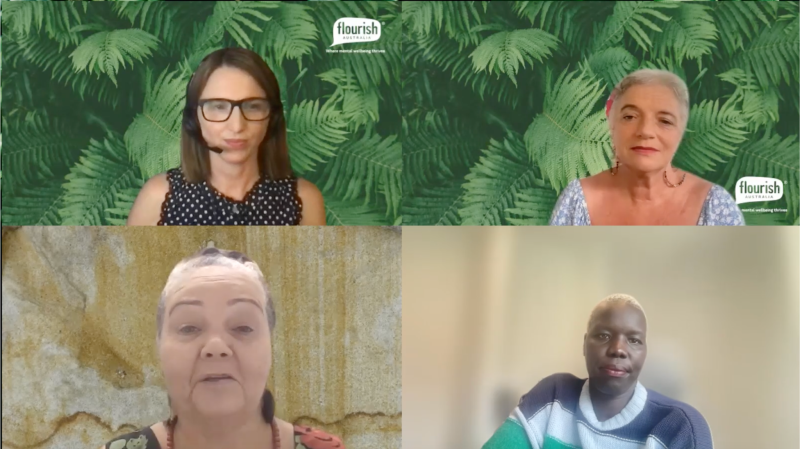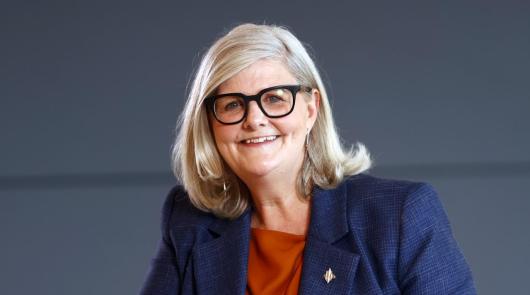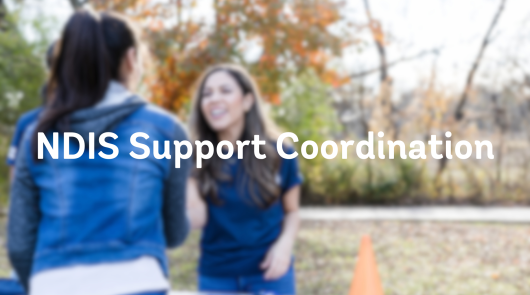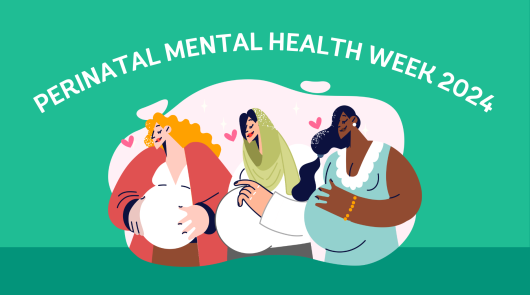
When we said ‘Let’s Do Lunch’ together for International Women’s Day 2023, we couldn’t have imagined just how uplifting the discussion around embracing equity would be, between our four, down-to-earth panellists, and webinar participants.
Our guest speaker Nyadol Nyuon framed ‘embracing equity’ as an indicator of our humanity and the health of our society, “It shouldn’t be seen as something extended by people with charitable hearts, toward women, whenever someone in our community isn’t succeeding, our common good is at threat.”
A passionate advocate for equity and human rights, Nyadol chose to not only share insights to her unique lived experience, but open the discussion to viewers.
Flourish Australia COO Susan McCarthy facilitated this year’s event, with a welcome to Country from the heart by Aunty Donna Ingram. Acknowledging her seven grandchildren, Donna expressed her hope that, in line with Flourish Australia’s commitment to supporting all people with lived experience to live extraordinary lives, the girls would enjoy equal opportunities it their lives. “While one woman endures oppression we all do!” Donna said.
Fay Jackson, our General Manager for Inclusion, contributed on behalf of people with lived experience. Our condolences to Fay who reflected on the funeral of a dear friend, earlier in the day, sharing that she fought to become a woman because women keep going, think always of others before themselves, and are soft but strong. “We all stand on the shoulders of the women who’ve gone before us and fought for rights we must never take for granted.” Fay said.
There is still much to do, and Susan McCarthy reflected that it’s often the women closest to us who make the biggest impact in our lives, as mentors and role models. “We are fortunate to share in the lived experience of women like Nyadol, who inspire us to keep going.” Susan said.
Formally introduced with an overview of her many accolades and awards, Nyadol said with humility that grace and luck have a hand in every woman’s journey. “I credit what I’ve achieved to the kind and generous women all around me, who encouraged me to keep going whenever doubt crept in.”
Born into a refugee camp, Nyadol shared that her mother was forced to flee on foot with her young daughters and newborn baby, for 40 days and 40 nights in pouring rain. “The memory impressed upon me what a strong and determined woman my mother was. An excellent student, life circumstances beyond her control deprived her of the education and opportunities I’ve had in my life.”
“I don’t think of resilience as a wall,” Nyadol says. “Experiencing trauma in my life triggered me to try to control everything to guarantee my survival, but it doesn’t work. It just takes something big enough to hit it, and the barrier you put up to protect yourself will break.” Nyadol suggests seeing resilience as a well that you need to fill daily, through self care, so it’s full when you need to draw on it.
Many questions from our online audience expressed appreciation to Nyadol for sharing such intimate insights to her personal journey. “When you exist in survival mode and a reactive state for so long, you mute certain aspects of yourself as a coping strategy” she explained. “Limiting myself to an intellectual focus was a way of not feeling my internal world, where our true identity is found.”
Separation from her family, and abusive situations, growing up in refugee camps, gave Nyadol a hunger to advocate for human rights. “Yet I pursued a career in commercial law as a sort of coping strategy.”
Admitting to living with a sense of ‘imposter syndrome’, she screamed and jumped for joy when first accepted into a law degree at Melbourne University, after coming to Australia at the age of 18. “I was 100% sure I’d be rejected,” a pattern of self doubt that has continued despite doors continually opening in her life. “I was painfully aware of a gap between myself and others and felt like a fraud. Then when I experienced a marriage breakdown and began a new life as a single parent, I worried constantly. I pushed myself to keep going, until my body showed me otherwise.”
The gift of that experience was being held up by the women in her community, “something I might otherwise never have experienced, that has shaped me into the woman I am today.”
Mental wellbeing comes with consciously cultivating healthy relationships, listening to your body, and nurturing an inner life you can retreat to when the world feels overwhelming.
With her own children, Nyadol chose to break the pattern of growing up without a mum or dad, by leaving the career she had fought so hard for, to be there for them. “It felt like a form of dying to give up what I held as my identity, to change my family story,” she said.
For all of the forms success has taken in her journey, Nyadol considers herself, first and foremost, a loving and supportive mum. Her hope for her daughter is that she will make the most of the opportunities made available to her by the women in her family who have gone before her, but that she will not need to fight so hard for future generations, “if we all do our part to embrace equity.”
What you wanted to know
Q: what kept you going in the right direction in life for you?
A: I enter into any challenge or opportunity with the assumption it will be ok. It’s helpful to find 2 or 3 things that anchor you and fill you up, like reading a book or going for a walk.
Q: How did you remain authentic to find your identity and maintain emotional and mental wellbeing.
A: I constantly question who I am and the choices I make, as a woman, as a South Sudanese woman, as an Australian woman. We are social beings who thrive when connected to others, so to a degree, it’s important to consider the choice that’s right for me in each scenario, considering what’s relevant within those communities I belong to and do life with.
Q: What’s your experience with intersectionality?
A: In Australia, there’s a tendency to still conceive of gender equity from a predominantly white woman perspective, but we encounter varying types of oppression as women, so we need to create a safe space where we can all be comfortable discussing our individual perspectives.
Q Is there somewhere in the world you look to for inspiration around equity ?
A: The Nordic countries are progressing well institutionally and not just around shifting attitudes.
Q: How do you see an end to discrimination?
A: I don’t see an end to it. I believe what matters is that we keep standing on the shoulders of those who’ve gone before us to bring hope through action, whether we succeed or not.
Q What are your views on the LGBTQI community?
A: Who am I to have a view on anybody’s life. Their claim to humanity should not be diminished on the basis of their gender identity.
Q: In your culture, how is mental health viewed?
A: When you live in survival mode, you are either ‘OK’ or you completely break down and are seen as ‘crazy’, but that’s developing and changing. The older generation can’t understand the high rates of suicide among young people in my community here in Australia ‘where there are no bombs’ so the 18-25’s are demanding to have the conversations and parents are listening.
Q What would you say to teenage girls about embracing equity and wellbeing?
A: Embrace your internal stubborn need to be yourself. Insist on following that foice and living life on your terms!
When I felt giving up law career, didn’t know what I was doing. Angry, frustrated.
Moving into another threshold isn’t always obvious as you are moving into it.
Words of inspiration – Nyodal shared this poem she wrote:
Nothing is meant for you
Maybe then nothing is meant to happen to you
Neither this cruelty or that grace
Yet it has happened
All that is left now is what you can make out of these pieces you call life
Talk to us today
For more information, contact us on 1300 779 270 or make an enquiry now.


